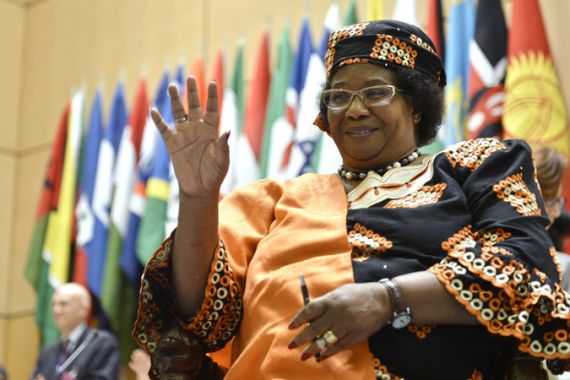Poor policing spurs Malawians to mob justice
Vigilantes say a sclerotic justice system has forced them to take matters into their own hands.

Blantyre, Malawi – Frustrated with a spate of armed robberies and deep flaws in Malawi’s criminal justice system, some people in this southern African country have decided to punish suspected criminals on their own volition.
Local media have published graphic pictures of suspects brutally attacked and burned by civilians. In November 2013, an angry mob in Malawi’s capital, Lilongwe, killed three suspected armed robbers at a bank at the City Mall. An angry mob surrounded the robbers after a shop owner gunned down the driver of the getaway car, and police attempting to rescue the alleged criminals were chased away by the crowd.
Frustrated Malawians have also torched police stations that refuse to release the suspects they want to “deal” with. More than six police stations across the country were burned last year alone in protest against their refusal to hand over suspects deemed to deserve mob justice.
Last month, police officers at Kabula police unit in Malawi’s commercial capital, Blantyre, used tear gas to disperse an angry mob armed with stones and man-made petrol bombs after officers refused to release two robbers from custody.
Statistics are difficult to come by, but many say Malawi has seen an increase in some types of crime in recent years. The Malawi Police Service claims that murder and robbery rates have risen since President Joyce Banda’s administration invalidated a “shoot-to-kill” policy in 2012, which had allowed the police to gun down suspects caught committing a crime.
Once people gain more trust in their law enforcement agencies like the police and the courts, they are less likely to undermine them with their own actions.
Banda’s predecessor, the late President Bingu wa Mutharika, had introduced the policy in an attempt to lower crime rates. Malawians saw the ugly face of the shoot-to-kill policy in 2011 during the July 20 anti-government demonstrations, when police shot and killed at least 18 people – sparking international condemnation and cuts in foreign assistance.
Banda removed the policy four months after taking power, saying it contradicted Malawi’s constitution, which provides basic rights to suspects.
Uladi Mussa, Malawi’s minister of home affairs and internal security, declined to comment for this article. Mussa has in the past downplayed reports of rampant crime in Malawi, claiming that opposition politicians were exaggerating the situation in order to score political points. On several occasions, Mussa has urged Malawians to call him on his personal cell phone number if they faced security problems.
Mike Nazombe, a social scientist at the University of Malawi, said Malawians may be resorting to mob justice because they mistrust the ability of the country’s law enforcement agencies to deal with criminals.
He said the prevailing mentality is, “let’s take the law into our hands, because those people who were empowered to do it are not able to do it”. The best way to prevent vigilante justice, Nazombe said, is for the state to improve law enforcement. “Once people gain more trust in their law enforcement agencies like the police and the courts, they are less likely to undermine them with their own actions”.
In a country with just one lawyer for every 37,000 Malawians, the backlog of cases, coupled with funding constraints, means many criminals wait on bail for months or even years for their cases to be heard before a judge.
According to a 2007 document from the US Department of State, the Malawi Human Rights Commission recorded more than 160 complaints in a year related to limited access to, or the unfair administration of, justice.
Many interpret these delays as a lack of will by law enforcement agencies to punish criminals. “We have seen criminals arrested but released two days later and start terrorising the communities again without police doing anything,” said a resident of Chirimba Township in Blantyre. “And when they are taken to court, it doesn’t take long before we see them back. So we feel it’s better to kill the criminals before they kill us and steal our property.”
But national police spokesperson Rhoda Manjolo told Al Jazeera that this does not give citizens the right to interfere with the justice system. “What the general public is supposed to know is that a person in custody is a suspect and is innocent until proven guilty by the court. A suspect has the right to police or court bails [within 48 hours of his or her arrest] depending on the gravity of the offence committed. Police do not sentence criminals but hand them over to the judiciary,“ she said.
Manjolo said mob justice is giving the police problems, because “mob justice destroys evidence and results in investigation deficiencies”.
She said there is no record that anyone has been arrested for vigilantism. “As police, we are trying to end this illegal way of handling suspects by sensitising the communities to the dangers. But at the moment, I don’t have statistics of people arrested because of engaging in mob justice.”